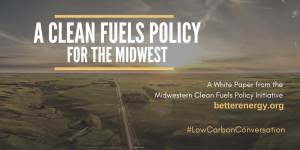 A new report details how a good clean fuels policy for the Midwest should be designed, recommending a “technology-neutral, portfolio approach that encourages a fair and competitive marketplace and benefits producers, consumers, agriculture, utilities, jobs, and public health.”
A new report details how a good clean fuels policy for the Midwest should be designed, recommending a “technology-neutral, portfolio approach that encourages a fair and competitive marketplace and benefits producers, consumers, agriculture, utilities, jobs, and public health.”
The Clean Fuels Policy for the Midwest white paper is the result of nearly two years of analysis and stakeholder discussion by the Midwestern Clean Fuels Initiative. Facilitated by the Great Plains Institute, the Initiative brings together fuels producers and marketers, nonprofit and research organizations, scientists and engineers, and agriculture and industry stakeholders. The Initiative’s consensus white paper illustrates broad support for a policy by diverse interests across the region. The paper is intended to inform further discussion of new and existing clean fuels policies and how they could be tailored to benefit the Midwest.
A Clean Fuels Policy evaluates all fuels based on lifecycle carbon accounting and assigns each fuel production method a unique carbon intensity (CI) score that is a complete “well-to-wheels” carbon equivalent emissions. For example, a CI score for gasoline or diesel includes emissions from crude oil extraction, transportation, refining, and combustion in a vehicle. A CI score for biofuel includes emissions from farming, biofuel production, transport, and combustion in a vehicle. A CI score for electricity includes emissions from production of electricity (including all relevant upstream emissions), sources of electricity, and the efficiency of electric vehicles.
The Renewable Fuels Association (RFA) and American Coalition for Ethanol (ACE) are among the diverse group of stakeholders known as the Midwestern Clean Fuels Initiative.
“This reunification is based on a shared vision for the Midwest to be a bigger part of the solution to climate change, but in a way which also spurs economic growth. We strongly encourage Midwest governors and legislators to read the white paper and consider new clean fuel policies which will expand economic activity and cut GHG emissions,” said ACE CEO Brian Jennings, co-funder/co-founder of the Clean Fuels Policy white paper process.

